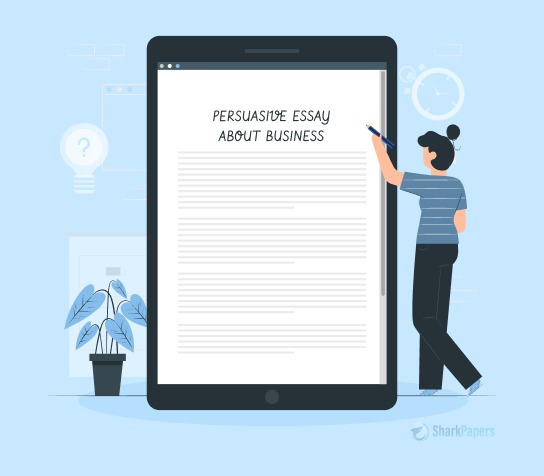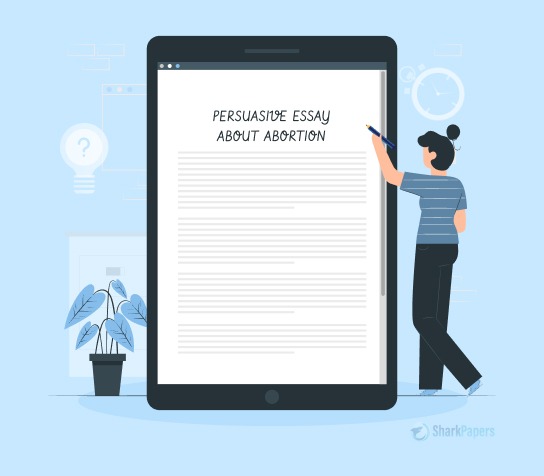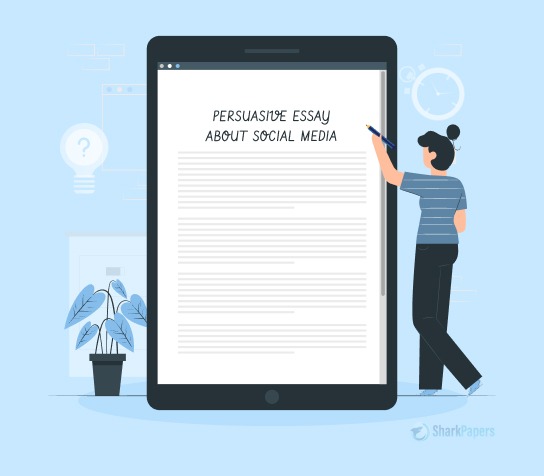What Is a Persuasive Essay?
Persuasive Essay Definition in a nutshell: "It is an argumentative writing piece that seeks to persuade the reader of a certain viewpoint."
Students write persuasive essays to convince their readers or opponents that their argument or claim is valid.
To achieve this, persuasive essays rely on compelling arguments and evidence to support their claims.
Persuasive essays are typically written in the first person point of view, using "I" statements, which can effectively deliver the main argument.
Elements of a Persuasive Essay
A persuasive essay has three main elements:
Ethos
Ethos is the appeal to character. Ethos is the attempt to persuade the reader that the writer is trustworthy and credible.
This can be done by sharing personal experiences or accomplishments and demonstrating expertise on the subject.
You can also show that you share the same values as the audience.
Logos
Logos is the appeal to logic. Logos is the attempt to persuade the reader through reason and evidence.
This can be done by presenting facts, statistics, or other data that supports your persuasive arguments in an essay.
Pathos
Pathos is the appeal to emotion. Pathos is the attempt to persuade the reader through emotions such as empathy, fear, or other feelings.
This can be done by telling a personal story or describing a situation that evokes emotion in the reader.
If you're looking for more information on persuasive essays, be sure to watch this video.
It will walk you through the basics and help you start your essay.
Now that you know what a persuasive essay is, it's time to start writing yours!
How To Write a Persuasive Essay
Writing a persuasive essay can be both an art and a science.
To write an effective one, it must contain a strong argument, convincing evidence to support the argument, and clearly articulated points.
Here are some guidelines for writing a persuasive essay:
How To Start a Persuasive Essay
To start your essay, you first need to develop different ideas to get started on your persuasive essay. They will be your argument or point of view and must be clear and concise.
Here's how you can do it:
Brainstorming
Brainstorming is important because it helps you narrow down your topic and choose a specific argument position.
You can’t write a persuasive essay without a topic, and you can’t debate a topic that doesn’t have two sides.
For example, you couldn’t write an essay about how the sun always shines. However, you could write an essay about why the sun is important.
Research is important because it helps you build your argument and provides evidence to support your claims.
Without research, you will have difficulty convincing the reader that your position is valid.
After you’ve done your research, it’s time to start writing.
To do this, you need to present your arguments clearly and persuasively.
The best way to do this is to structure your essay in a way that makes sense and is easy to follow.
Outline
Once you have your points, it's important to use a persuasive essay outline to organize them. This will make it easier for the reader to follow your argument as:
- Persuasive essays require a lot of planning and organization
- An outline helps you stay on track and ensures that your essay is organized
- An outline also helps you to develop your argument logically
- Having an outline makes the writing process easier and less stressful
- Outlines can be modified to fit the needs of any essay.
The basic structure of a persuasive essay is as follows:
- Introduction
- Hook
- Background information
- Thesis statement
- Hook
- Body Paragraphs
- Argument 1
- Argument 2
- Argument 3
- Argument 1
- Conclusion
- Restate the thesis statement
- Call to action/future prediction.
- Restate the thesis statement
The first step to writing a persuasive essay is brainstorming ideas and picking a topic.
Once you have your topic, it’s important to research and develop arguments that will support your position. After collecting evidence, you need to craft an outline and start writing.
Steps To Write A Persuasive Essay
A persuasive essay has three main components:
- The introduction sets the tone for the essay and introduces the reader to the argument that will be made.
- The body is where the evidence is presented supporting the argument.
- The conclusion wraps up the essay and leaves the reader with a final thought.
Now that we know the components of an effective persuasive essay, let's look at the first component in detail.
The Introduction
In the introduction paragraph, introduce the topic and provide background information on your main point.
An introduction must interest the reader in some way, so they want to continue reading.
Here’s how you can ensure that:
- Start with a hook.
The first sentence of your essay should be a hook statement that grabs the reader's attention.
This could be a quote, an anecdote, or a question. It should be something that will make the reader want to continue reading.
- Introduce your topics
After your hook, you need to give background information on your topic. This will help the reader understand what you are arguing for.
- Summarize your main point.
After you have given some background information, you need to state your thesis statement.
This is the main point of your essay and should be one or two sentences long.
Body Paragraphs
The body paragraphs are the evidence presented supporting the argument. Each body paragraph should focus on a different piece of evidence.
For example, suppose the essay argues that video games are beneficial. In that case, one body paragraph could focus on the benefits of video games for problem-solving skills.
In contrast, another could focus on the benefits of video games for hand-eye coordination.
A strong body paragraph will also be well-organized and clear. To write a good body paragraph, you must start by:
- Introducing the argument that will be made
- Presenting evidence in support of the argument
- Wrapping up the essay, and leaving the reader with a final thought.
How To End A Persuasive Essay?
The conclusion of a persuasive essay is one of the most important sections. It should sum up all of your arguments and have a lasting impact on the reader.
To achieve this, an effective conclusion should:
- Restate Your Main Argument:
The conclusion should remind the reader of your main argument or point you were trying to make.
This is a great opportunity to reiterate your main idea and give the reader closure.
- Summarize Supporting Points:
A summary of your supporting points will help to strengthen the overall argument you presented.
The reader should walk away from the essay feeling informed, inspired, and confident in their point of view.
Finally, don’t forget to proofread!
Careless errors can take away from the power of your argument. So, read through your essay multiple times before submitting it.
This is also a good time to review any writing or formatting conventions you may have missed.
You worked hard on your essay, so don’t let a few careless mistakes take away from its effectiveness!
Persuasive Essay Format
When it comes to persuasive essays, there are some specific formatting guidelines you should follow.
- Title Page: (Depending on your instructor’s requirements)
- Line Spacing: Double-spaced (or 2.0)
- Font Style: Times New Roman
- Font Size: 12-pt normal text; 16-pt and 14-pt for headings
- Margins: 1-inch on both sides
- Alignment: Left-aligned
- Paragraph Indentation: All paragraphs should be indented by 0.5 inches (1cm).
- Textual Citations/References: Include an in-text citation and a reference page when necessary.
The format for in-text citations and reference pages will depend on the style guide your instructor requires.
The concluding paragraph should summarize key points from the body and a restatement of your claim.
Persuasive Essay Examples
It is often said that the best way to learn is by example. In the world of writing, this is especially true.
A well-written essay can be a powerful tool for persuasion, while a poorly written one can do more harm than good.
Let's look at some examples to see what makes a persuasive essay effective.
Looking for more samples? Give these persuasive essay examples a read!
Good Persuasive Essay Topics
There are many good persuasive essay topics to choose from. Here are some that should be interesting for students to write about:
- The legal drinking age should be lowered to 18.
- Marijuana should be legalized for medicinal purposes.
- Capital punishment should be abolished.
- School uniforms should be mandatory in all schools.
- Children under 12 should not be allowed to use cell phones.
- The voting age should be lowered to 16.
- The use of animals for scientific experimentation should be banned.
- Cigarette smoking should be banned in all public places.
- All forms of gun control should be abolished.
- The drinking age in the United States should be lowered from 21 to 18
Didn’t find a suitable option? Maybe these persuasive essay topics have something for you!
Tips To Write A Compelling Persuasive Essay
Now that you understand what a persuasive essay is and how to write one, it's time to learn the tips and tricks that will make it shine.
Know Your Audience
Understanding who you are writing for can help you tailor your essay to their beliefs and values.
Knowing your readers' opinions will also help you decide what evidence to include in your essay.
Develop An Argument
A strong persuasive essay should have a clear argument or point of view supported by evidence.
Make sure to consider both sides of the argument and craft your essay to outline why your point of view is better than the other side.
Structure
A persuasive essay should be structured in a logical, easy-to-follow format with an introduction, body, and conclusion that works toward persuading the reader.
Include in-text citations and back up your argument with facts and evidence.
Use Language Correctly
Using the right language can help you make a strong point and convey your message.
Use appropriate words for your audiences, such as formal vocabulary or slang, depending on who you are writing for.
Proofread
Once your essay is written, take the time to proofread it for grammar and spelling errors.
This will help you ensure that your essay is clear, concise, and free of any mistakes that may take away from its power or effectiveness.
The goal of a persuasive essay is not simply to state your opinion but rather to argue why your opinion is correct.
To sum up…
In this guide, we have taught you how to write a persuasive essay that stands out and gets the attention it deserves.
Are you struggling to write a persuasive essay? Do you need an essay writing service that assists you in getting good grades?
Look no further than our college paper writing service.
Our professional persuasive essay writers are experts in writing effective persuasive essays.
They know how to capture your reader's attention and keep them engaged until the end. So if you need help writing a persuasive essay, don't hesitate to hire one of our writers.
At SharkPapers.com, we offer a safe, private, plagiarism-free persuasive essay writing service that always delivers on time.










-5402.jpg)
-5640.jpg)






 Not seeing it? Check Promotions or Spam — inboxes get protective.
Not seeing it? Check Promotions or Spam — inboxes get protective.